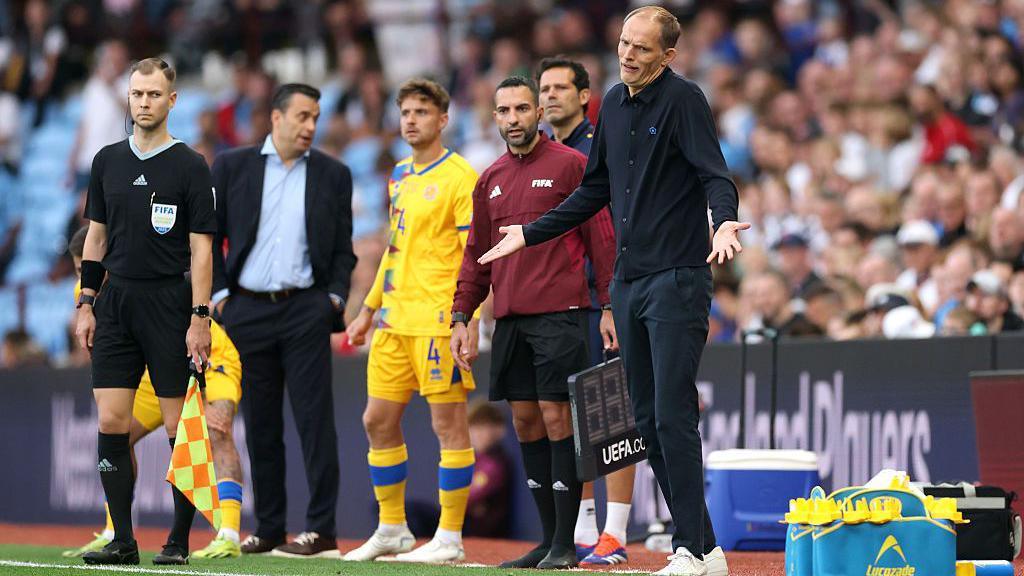England Under Tuchel: Alarming Regression Despite Wins
The reluctant applause that rippled through Villa Park as supporters filed out before full-time spoke louder than any scoreboard. A 2-0 victory over Andorra—a nation ranked 174th globally—should have been routine. Instead, it exposed England’s deepening identity crisis under Thomas Tuchel. Though four consecutive World Cup qualifying wins paint a façade of progress, beneath the surface lies an unsettling truth: England’s regression under Tuchel isn’t just a dip in form—it’s a systemic decline threatening the team’s long-term ambitions.
Hollow Victories Reveal England’s Regression
Statistically, England’s qualifying campaign appears flawless: four wins, nine goals scored, one conceded. Yet dissect performances against minnows like Andorra and San Marino, and the regression becomes undeniable. Against Andorra’s squad of semi-professionals, England managed only two goals—one a scrambled Declan Rice header, the other an own goal. The numbers tell a damning story of creative stagnation:
– Shots dropped from 20 in June’s meeting to 11
– Key chances created fell from 6 to 4
– Opposition box entries decreased from 52 to 41
Tuchel praised controlled possession, but Villa Park’s emptying stands by the 80th minute revealed fan disillusionment. England’s regression under his leadership isn’t merely about underwhelming results—it’s a growing disconnect between expectation and execution. When a team stacked with Premier League stars labors against part-time opponents, alarm bells ring.
Tactical Stagnation Fuels England’s Regression
Tuchel’s appointment after Euro 2024 promised a revolution: dynamic vertical attacks, tactical flexibility, and unlocked potential. One year later, England’s playbook reads like a manual for predictable stagnation. Against Andorra’s compact 5-4-1, key attackers looked lost:
– Marcus Rashford recycled possession without incision
– Harry Kane touched the ball just nine times in the final third
– Eberechi Eze disappeared after halftime
Only debutant Elliott Anderson and marauding right-back Reece James offered glimpses of intent—a troubling indictment of Tuchel’s preferred veterans. The manager’s post-match insistence on needing final-third refinement feels increasingly hollow. England’s regression isn’t about marginal adjustments; it’s rooted in tactical principles failing to translate from training ground to pitch.
Four Pillars of England’s Alarming Regression Under Tuchel
1. Attacking Identity in Crisis
Nine goals in four games—including a penalty and an own goal—against Europe’s weakest defenses is indefensible for a squad boasting six of the Premier League’s top scorers. The fluid interchanges of the Southgate era have been replaced by slow-build possession ending in hopeful crosses. England’s forward pass percentage (23%) remains unchanged since Tuchel took charge, betraying his promised verticality.
2. The Erosion of Fan Connection
Record-low attendance threatens to turn Wembley into a library. June’s qualifier drew just 53,000 fans—England’s smallest crowd since 2018—while Tuesday’s Belgrade clash risks dipping below 40,000. When supporters leave early during a victory, it’s not frustration—it’s apathy. England’s regression under Tuchel isn’t just technical; it’s emotional.
3. Tactical Uncertainty
Southgate’s counter-attacking blueprint had flaws but clear patterns. Under Tuchel, players resemble chess pieces shuffled without a board. Constant formation shifts—from 4-3-3 to a disjoined 3-4-3—leave attackers disconnected. Jude Bellingham’s late-arriving runs, once lethal, now see him isolated between defensive lines.
4. Complacency vs Elite Standards
The fearlessness that propelled England to three consecutive tournament semifinals has vaporized. Passive possession masks dwindling intensity—a dangerous trait against elite opponents. If facing Serbia next week replicates Tuesday’s lethargy, England’s regression could turn humiliating.
Belgrade: The Crucible for England’s Regression
Tuesday’s qualifier in Serbia’s Rajko Mitić Stadium—a cauldron of nationalist banners and deafening whistles—offers no hiding place. England’s regression under Tuchel faces its most brutal stress test yet:
– Rashford’s Redemption or Gordon’s Gambit?
With Rashford’s confidence crumbling (one goal in 12 appearances), does Tuchel trust Anthony Gordon’s explosive directness?
– Kane’s Isolation Crisis
England’s captain touched the ball more in his own half (27 times) than Andorra’s penalty area (9) last outing. Fixing this disconnect is non-negotiable.
– The Verticality Mirage
Tuchel’s promised progressive play remains theoretical. Serbia’s physically imposing midfield will expose any hesitation in transition.
Qualification Secured, Progress Lost
England’s paradox under Tuchel grows starker with each win. They dominate possession but lack cutting edge (1.8 xG per qualifier vs 2.7 in Euro 2024 qualifying). They control games yet inspire fewer fans. While World Cup qualification remains probable, performances suggest the Three Lions aren’t evolving—they’re regressing toward mid-tier complacency.
Silver glimmers exist: Rice’s burgeoning leadership and Anderson’s fearless debut hint at untapped potential. But these sparks highlight the broader darkness—without urgent tactical clarity and restored hunger, England’s regression under Tuchel will solidify into irreversible decline.
The 2026 horizon beckons, but this team isn’t building toward glory—it’s masking decay with narrow wins. Unless Tuchel rekindles the identity that once made England fearless, today’s controlled victories will become tomorrow’s tournament humiliations.
